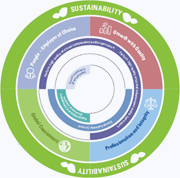Growth with Quality
 As reported in the previous chapter, four pillars form the strategic basis of our Organization, and based on these four pillars, strategic objectives and goals were established and prioritized, aimed at integrating and potentializing the actions of the KPMG International member firms around the world.
As reported in the previous chapter, four pillars form the strategic basis of our Organization, and based on these four pillars, strategic objectives and goals were established and prioritized, aimed at integrating and potentializing the actions of the KPMG International member firms around the world.
Sustainability is a value that permeates our strategy, and just like the connection between the strategic pillars and the material themes, it is illustrated throughout this report, reflected in the management and performance presented, and in the challenges and opportunities that we will face along the path towards sustainable development.
The four material themes prioritized by our stakeholders, included providing quality and independent services, in third place. KPMG also understands that sustainable growth can only be reached when grounded on the quality of its services, and consequently Growth with Quality is one of the fundamental pillars of our strategy.
Performing with quality, ethics and independence, supported by respect for the needs of our clients and the capital markets and the ability to continue in the direction of our mission, creating value and opportunities to enable our different public achieve their full potential is our way of addressing this material theme.
At KPMG, the quality of our services is made viable by an ethical culture and high performing professionals, within a global model of providing services that is supported by a network of shared knowledge. This network includes our global Centers of Excellence in the Audit, Tax and Advisory practices, and in several operating segments within each of these, for example the segment for climate changes and sustainability and Government and the public sector.
Differentiated Approach
Within the global ambit, KPMG offers professional Audit, Tax and Advisory Services. We aim to provide services that are adapted and personalized to the segment in which each client operates, through our Industry Program. In order to attend our clients in a customized manner, we rely on top performing professionals who have differentiated skills – accounting, finance and management – and an operational process aligned worldwide, and supported by constant market research.
Government and the Public Sector
The Centers of Excellence that focus on Government include specialist teams that offer leadership thinking, knowledge and experience in seven fundamental sub-sectors for the strategy of new world governance:
- Justice and Security
- International Development
- Education
- Defense
- Human and Social Services
- Cities
- Treasury and Finance
Our business model is complemented by the activities of the Markets area that permeate the three service areas – Audit, Tax and Advisory – to maximize the relations between the three, and by the Business Development Managers (BDMs), who are responsible for developing business and attending clients from different market sectors.
In addition, we have structured the Brazilian Multinational segments focused on assisting Brazilian companies whose operations are expanding throughout the world, and also the German, China and Japanese Desks, which attend German, Chinese or Japanese companies or joint ventures, irrespective of the operational sector or location of their business.
We always aim at the quality of our services, and as such, we seek to align this differentiated approach to the training and development of our professionals as well as to the risk, quality and integrity reliable control systems, which underpin our organizational structure globally. These points are shown in the current strategic pillars, detailed throughout this report.
Industry Program
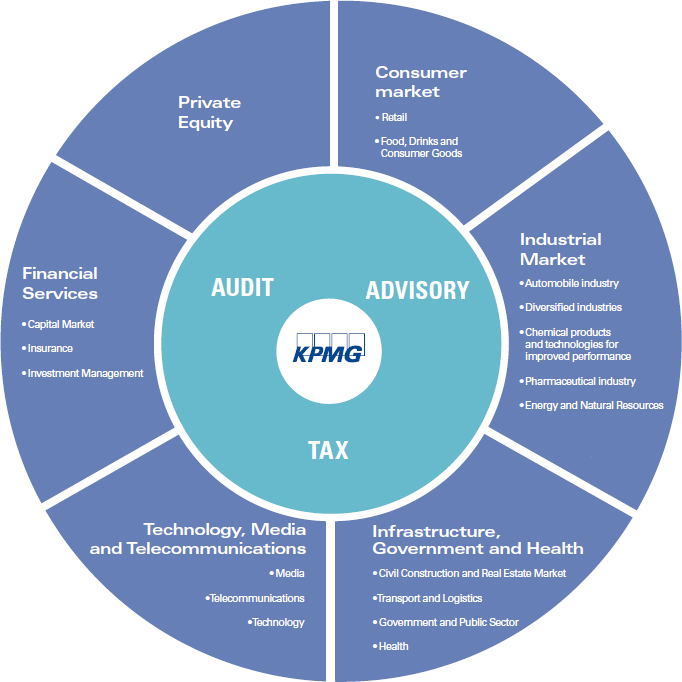

Our practices
GRI 2.2
Audit

Committed to quality, ethics, transparency and independence, the objective of our audit services is to strengthen the reliability of the information prepared by clients for use by their investors, creditors and other stakeholders. We are qualified to attend our clients in the audit of financial statements according to International Financial Reporting Standards (IFRS).
IFRS
international accounting standards published and revised by the International Accounting Standards Board (IASB). These international standards were developed for the purpose of standardizing consolidated financial statements published by public stock corporations.
Our methodology for auditing financial statements was developed to attend local and international audit standards and offers exclusive computerized techniques from KPMG International and tools that help teams to access knowledge to exercise their functions effectively and efficiently.
We have IFRS in Brief, which provides a summary of the standards, comments from the IASB meetings and the International Financial Reporting Interpretations Committee (IFRIC). We also have the IFRS Briefing Sheet, which deals with specific requirements and questions in more detail.
The Audit segment refers to the audit of financial statements and audit related services (IFRS, GAAP Accounting). Our services in this segment increased by 18% compared to the previous year and we forecast growth of 30% for the next year.
.
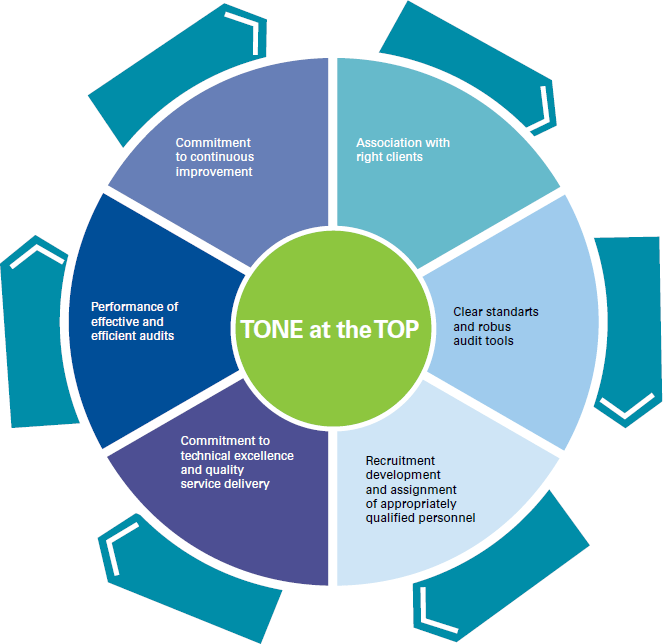

GRI SO5
Compulsory rotation of auditors – Panorama: for the Securities Commission (CVM), one of the advantages of this compulsory rotation of auditors is to avoid bias and favoritism during the audit of financial statements of companies. This rule has been extensively discussed in Brazil and abroad, and has been criticized by entities that represent public stock corporations.
Perspective of KPMG in Brazil: we support the extension to the rotation period included in the new rule, but we believe it would be more appropriate to rotate the professionals responsible for undertaking the work and not the audit companies. This would strengthen the credibility of the service and any audit bias would be minimized by the rotation of the professionals responsible. The longer the relationship with the client, the greater the understanding of its business, its control systems and culture, which is then translated into an efficient audit.
| Creation of the rotation, by the Securities Comission (CVM), Instruction nr. 308, which demanded that independent audit companies contracted by organizations be replaced every five years. |
Announcement of temporary suspension of compulsory rotation until 2011, in order to minimize the impacts from companies adapting to the IFRS, adopted in Brazil in 2010. |
Alteration of part of the norm, establishing that companies that have a Statutory Audit Committee (SAC) in accordance with the terms required by Instruction 509 can contract audit firms for up to ten consecutive years. |
| 1999: | 2008: | 2011: |
 |
||
Tax
The Brazilian tax system has unique characteristics that increase the challenges and opportunities to work in this sector. Our service portfolio, consolidated from experience working internationally, assists our clients to anticipate and respond to tax changes and governance requirements. The Tax services include advisory for developing tax policies and processes aimed at making feasible compliance with tax obligations, assisting in structuring operations, managing tax risks and reducing operational costs.
We offer solutions for corporate taxes, indirect taxes, tax planning, transfer prices, advisory for international executives, international taxation, advisory for acquisitions and mergers, financial services, out sourcing.
Our Tax services increased 27% compared to the previous year, and we anticipate growth of 20% for the next year.
 Advisory
Advisory
The Advisory practices support the strategic decisions and development of projects at companies adopting a multidisciplinary approach, which includes skills in strategic planning, mergers and acquisitions, corporate governance, outsourcing of services, innovation and strategic use of technology.
The services are distributed between the Risk Consulting, Management Consulting, Transactions & Restructuring and Business Process Outsourcing Areas. Growth compared to the previous period was 22%, and we anticipated growth of 31% for the coming year.
Risk Consulting: assists clients to deal with the risks inherent to their business, and includes its governance structure, management and its operational processes. This coverage enables risks to be avoided, not only at strategic and management levels, but also at regulatory and activity levels.
In Risk Consulting, we assess the risks related to accounting aspects and the preparation of financial statements, information technology (IT Advisory Services), the operational processes (internal audit and compliance), financial (Basel, Solvency), corporate governance (going public, family companies, corporate aspects), frauds (Forensic) and sustainability (environmental, social and regulatory).
GRI EC2
Social and environmental questions are increasingly becoming part of our daily routine. The climate changes and their consequences have demonstrated the need for a general change in the way business is performed. Companies are Increasingly required to operate in their markets considering questions of sustainability, focusing on maintaining natural resources and changes in patterns of consumption.
We see in this movement not only as a responsibility assumed with our clients and different related public, but also as an opportunity in a market where these questions are increasingly relevant.
The result is the perception of new demands from our clients, whereby corporate leaders seek to implement sustainable practices and strategies within their companies. To attend these clients, we treat sustainability as jointly and comprehensively, offering differentiated services such as Climate Change and Sustainability Services (CC&SS).
Climate Change and Sustainability Services (CC&SS)
Objective: assist organizations of different sizes and from different sectors to understand the context of sustainability, position themselves within this context and identify the best strategy for operating and reporting information, including risk management.
 Team: multidisciplinary, consisting of more than 350 specialists, in 40 countries, that adopt the same work methodology, guaranteeing the KPMG global quality standard.
Team: multidisciplinary, consisting of more than 350 specialists, in 40 countries, that adopt the same work methodology, guaranteeing the KPMG global quality standard.
Services:
- Diagnosis of risks and opportunities related to climate changes.
- Support in consolidating information and filling out questionnaires for references proposed
by the Business Sustainability Index (ISE), Dow Jones Sustainability Index (DJSI), Carbon
Disclosure Project (CDP), amongst others. - Assessment of the green house effect gases on the chain of suppliers and/or by product.
- Define the socio-environmental Key Performance Indicators (KPI’s).
- Verify the Socio-environmental suppliers chain.
- Environmental assessment and Due Diligence.
- Define the strategy for management of solid residues.
- Evaluate the impact and volume of hydro resources consumed by product (water footprint).
- Preparation and independent verification of inventories and issue of green house effect gases.
- Independent verification of sustainability reports, social balance sheets, amongst others.
Management Consulting, aimed at improving performance, the strategic use of technology and innovative processes, supporting clients in the strategic execution of their objectives and identifying and implementing improvements and innovations with an integrated vision
of processes, information technology and personnel.
The services offered by the Management Consulting area include: Financial Management; Business Process Redesign and Improvement; Business Effectiveness; Project Management; Business Process Sourcing & Shared Services; Change Management; Talent Development & Management; TI Governance; and Information Security.
Transactions & Restructuring (T&R )assist clients to obtain results from different types of financial transactions, and its performance is based on the combination of business, technical and sector knowledge.
The T&R services include: Corporate Finance (including evaluations, acquisitions and merger advisory, financial advisory for infrastructure projects/PPPs and Debt Advisory); Transaction Services (including Financial Due Diligence, Vendor Due Diligence and Strategic and Commercial Intelligence); and Restructuring Services/Non Performing Loans Advisory.
Business Process Outsourcing (BPO): is an important service that implements and operationalizes the strategic vision and system for middle activity processes (back and front office), in order to provide the necessary support for decisions and end activities for clients, from management level to directors, through continual and agile optimization; transforming data into accurate and up to date management information.
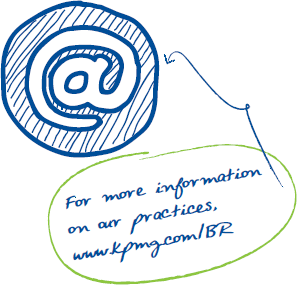
Through this service, KPMG operates in the front and the back office and provides an integrated system to enable the client to focus on its business and, at the same time, have access to a general vision and accompany each step in the processes performed. As such, the client is able to take assertive decisions based on complete timely information.
KPMG in the life cycle of companies
GRI EC9
Our services have a strategic role and can generate value and positive direct and indirect impacts for our clients, by offering solutions to the challenges and opportunities in different stages of their life cycle, and help them define a long term competitive business strategy.
Through our activities we generate significant indirect economic impacts. Besides helping our clients during their journey of growth, creating income and employment in the communities in which they operate, we actively participate in debates on the regulatory environment for our activities. Our services also provide confidence to the capital market in general and its agents, such as analysts, investors and regulatory bodies. With our intensive investment in training and professional development, we contribute through the placing of specialized individuals on the market, which generates value for our company, clients and society. Some of these professionals do not continue their career with KPMG, and take the expertise acquired in our organization when then join other important national and international companies.
KPMG value proposition on client’s life cycle


| Audit Tax Advisory Note: To maintain independence, some services may not be offered simultaneously by KPMG. |
Financial Statements Audit has an important role in capital markets, providing transparency and reliability of financial information essential at all times in the company (e.g.: obtaining financing, acquisitions, IPO, capital increase, providing accountability to shareholders, among others). |
Investments and innovation
To expand our activities and promote the growth of our organization in a solid way, we constantly invest in the regional diversification of our operations. We believe that our presence in the five regions in Brazil is as important as the global and integrated activities of the network of KPMG International member firms, since it enriches the exchange of experiences and knowledge and enables us to apply international knowledge to the specific realities of each region.
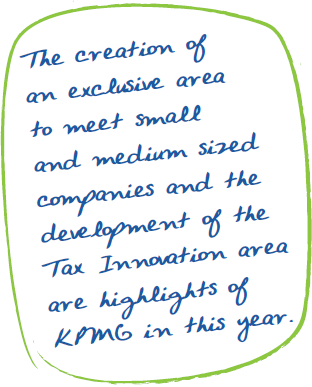
Aligned with the strategic objectives established for the period 2011-2015, the acquisition of the fifth largest audit firm in Brazil, and the successful integration of a group of around 1,000 professionals to KPMG in Brazil’s activities, strengthened our regional diversification. With this acquisition, we also created an exclusive area to attend the growing market of small and medium sized companies, referred to in our organization as Entrepreneur Market. GRI 2.9
We believe that this market offers opportunities despite the international macroeconomic instability, given the strong growth on the domestic market. These companies should also increase their participation in the Brazilian capital
market and consequently, will need to adapt to another
level of professionalism, market visibility, management
and corporate governance.
We are qualified to attend these clients during a period of change, assisting in the expansion and consolidation of these companies on the domestic and international markets, ensuring that they are recognized for their innovative management practices and the transparency of their operations and accountability to the market.
In 2011 an important achievement was the creation of our Tax Innovation area as an example of investment in technology and new methodologies that generate value for clients within this environment of frequent changes. The professionals from this area are dedicated to developing technological solutions to the review of accounting and tax information and tax compliance.
The system developed by KPMG is available now and consists of a complete solution for assurance on electronic tax information, and it is operating at several of our clients, providing consistency in reporting to municipal, state and federal government.
95% of organizations worldwide are small or medium sized companies, according to data from the Organization for Economic Cooperation and Development (OCDE)
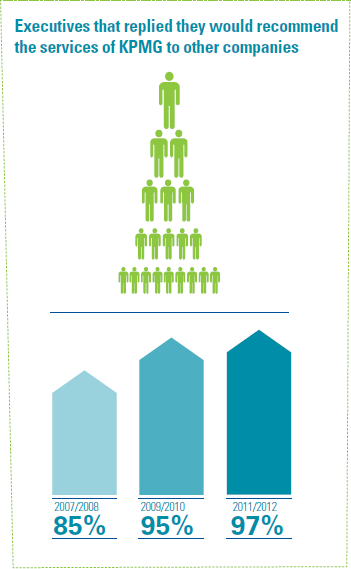
Client and Market Relations
GRI 4.16
maximum grade: 10.0
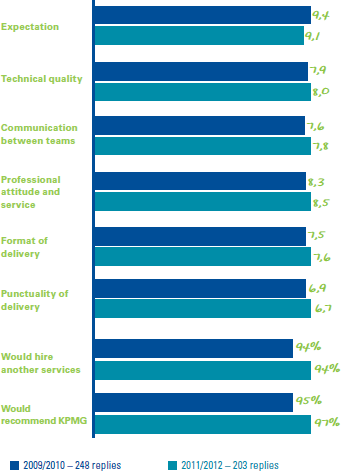
Client satisfaction
GRI PR5
We have a constant dialogue with our clients through our teams working in the field. Thus, we receive feedback and we can identify our strong points and those that could be improved.
The Satisfaction Research is a tool that complements the feedback and helps us to adapt our services to clients’ expectations, encouraging our development and strengthening our relationships. Within the same context, the process for engaging stakeholders in 2011 was an important instrument to understanding questions relevant to undertaking our business, according to the perspectives of our main public.
Until 2007/2008 the Satisfaction Research was performed by an external consulting firm (Gis Market), which interviewed various clients. As from 2009/2010, the format and indicators for the research were revised, and it is now sent to clients in electronic forms.
Dialogue, promotion and

exchange of knowledge
GRI 4.16

We aim to develop close relationships with our clients to improve the efficiency of our services. Thus, not only do we meet specific demands, we help develop companies and the market through dialogue and the exchange of knowledge.
The Audit Committee Institute (ACI) and the CFO Meeting are two debating groups organized by KPMG aimed at disseminating and absorbing knowledge and good practice on the main political economic trends, corporations, legal and tax trends, which are all concepts included in their businesses. As from 2011, given the demands from our public, we decided to focus the debates on the ACI, which held six meetings during the year involving a total of approximately 600 participants.
Businesses face numerous challenges and opportunities. Besides the services that we provide and the environment for debates, the network of KPMG International member firms has developed researches and studies and sponsored seminars and events that address a lot of the complex questions and provide clarity and guidance.
This context is propitious for the discussion on sustainability. At KPMG, we believe that sustainability is not just a regulatory question, and that the promotion and generation of knowledge for innovation and strategic development that makes financially viable solutions and programs aimed at sustainability can create greater understanding and engagement from the private sector.
The media is considered one of the most efficient tools for distributing information, through its different communication channels. During the financial year 2010/2011, we were mentioned directly or indirectly in 3,135 newspaper or magazine reports. The majority of these related to the transmission of knowledge, either through information on one of our studies or researches, which bring together the expertise of our professionals together with the most important assessments of the market and our clients, or in interviews and clarifications given by our professionals.
 Amongst the publications of KPMG in Brazil, we highlight the following:
Amongst the publications of KPMG in Brazil, we highlight the following:
| Audit | |||||||
Launch 01/18/2011 |
 Accounting and Tax Synopsis 2010 |
Launch 02/09/2011 |
 Insurance Regulatory Practice – 2011 |
||||
Launch 02/10/2011 |
 Regulatory Practice 2011 – Banks |
Launch 09/15/2011 |
 II Directory of Accounting Transparency and Corporate Governance Administrative Region of Campinas (SP) |
||||
| Tax | Advisory | ||||||||
Launch 01/18/2011 |
 Accounting and Tax Synopsis 2010 |
Launch 01/26/2011 |
 Research on Mergers and Acquisitions – 4th quarter – 2010 |
Launch 05/05/2011 |
 Mining Forum Brazil |
||||
| The publications prepared by KPMG International member firms during this period, included the following: | |||
 The Green Challenge for Telecoms KPMG China, 2011 |
 Sustainable Insight October 2010 Accounting for water |
 Sustainable Insight January 2011 Articulating the value of sustainability to mainstream investors |
 Global Anti-Bribery and Corruption Survey 2011 |
 Financing Low- Carbon Investment on Developing Countries KMPG International, 2010 |
 Sustainable Future. Sustained Advantage |
 Offshore Wind in Europe |
 Proactive Uses of Data Analysis in Anti Corruption Compliance |
 Fighting Fraude, Issue 29 |
 Survey on Bribery and Corruption |
 Global Transfer Pricing 2011 |
 Global Debt Sales |
 Transforming Finance |
 Access these and other KPMG publications at
Access these and other KPMG publications at www.kpmg.com/br/pt/estudos_analises/artigosepublicacoes |
||
Some events during the period:
| 2010 | ||||||||
| October/2010 | November/2010 | |||||||
| 11th Internal Audit Congress,
Compliance and Risk Management |
Revelation Award in Finance IBEF SP |
|||||||
| The Olympics and the City – Rio-London connection |
4th China Latin-America Business Summit | |||||||
| Seminar Tony Blair + World Forum on Sustainability | XV Latin American Congress on Internal Audit – CLAI 2010 | |||||||
|
VII International Seminar CPC – “Convergence of Accounting Standards” APIMEC |
|||||||
| XXVI ENCONSEL - National Meeting of Accountants from the Electrical Energy Sector |
||||||||
| Congress for Accounting and Tax for Financial Institutions - CONECT 2010 |
||||||||
| TMA Brazil Congress for Restructuring Companies | ||||||||
| 2011 | ||
| March/2011 | April/2011 | |
| Rio Investment 2011 |
Road-Show Regional Retail | |
| 3rd Annual Brazilian Reinsurance Conference | ABVCAP 2011 Congress | |
| Hedge Fund Brazil Forum | Amcham DF CEO Forum | |
| May/2011 | June/2011 | |
| Brasil Investment Summit 2011 | Expo management 2011 |
|
| 12th Internal Audit and Compliance Congress | Amcham Campinas - Seminar on Brazil’s Competitiveness | |
| 6th ANBIMA Investment Fund Congress | LCCI Brazil Trade Mission | |
| August/2011 | Setembro/2011 | |
| ABRASCA 2010 Directory - Review/Audit of ABRASCA Award for creating value 2011 |
Pre-Salt Brazil 2011 International Congress & Exhibition |
|
| 2nd Annual Brazilian Bankruptcy and Distressed/High Yield Symposium |
||
| 32nd Brazilian Internal Audit Congress - Conbrai 2011 |
||
| Transparency Trophey ANEFAC – FIPECAFI – Serasa Experian 2011 | ||
![]() We also encourage and support the dissemination of knowledge through events, seminars and lectures.
During 2011, we invested R$ 2.3 million in these initiatives.
We also encourage and support the dissemination of knowledge through events, seminars and lectures.
During 2011, we invested R$ 2.3 million in these initiatives.
Entities supported by KPMG in Brazil and the type of contribution offered
GRI 4.13
Whilst undertaking our business, another way that we engage with our public and participate in important discussions for the capital market and our communities as a whole, is through associations with different entities, where we also share knowledge and offer our professionals to be members of boards, councils and working groups aimed at specific themes.
Brazilian Association of Wholesales and Distributors (ABAD): association, participation in events. Brazilian Association of Financial Law (ABDF) Rio de Janeiro: association, participation in events. Brazilian Association of Human Resources (ABRH) Brazilian Association of Private and Venture Capital (ABVCAP):association, participation in events. Rio de Janeiro Commerce Association (ACRJ): Association of Analysts and Professionals from the Capitals and Investment Market (Apimec) São Paulo: association, participation in events and composition of director table. Brazilian Association of Public Stock Corporations (Abrasca): association, participation in events. Campo Grande Commerce Association (ACCG): British Chamber of Commerce and Industry in Brazil (Britcham) Brazil-Germany Chamber of Commerce (AHK) Rio de Janeiro and São Paulo: association, participation in events, marketing actions and exchange. The AHK São Paulo, includes a KPMG Professional in the Marketing Working Group. American Chamber of Commerce – Amcham Brazil: Iêda Novais, a KPMG director, is a member of the Administration Board and Chairman of the Sustainability Committee. American Chamber of Commerce (Amcham) Belo Horizonte, Brasília, Campinas, Curitiba, Goiânia, Porto Alegre, Recife, In total, 18 professionals from KPMG are members Japanese from Brazil Chamber of Commerce and Industry: Brazilian Dutch Chamber of Commerce (Dutcham): participation in events. Alexandre Fujimoto, Audit director at KPMG, Portuguese Chamber of Commerce in Brazil (CPCB) Rio de Janeiro e São Paulo: participation in events. At CPCB Rio de Janeiro, Bernardo Moreira, Audit partner at KPMG, is a member of the Statutory Audit Council. |
Brazilian Center for International Relations (Cebri): Regional Administration Council - São Paulo (CRA): Regional Accounting Council (CRC): Brazilian Institute of Finance Executives (IBEF) São Paulo, Campinas, Curitiba and Rio de Janeiro: participation in events, lectures, boards and study groups. At Ibef São Paulo, Pedro Melo, the Chairman of KPMG, is a board member and Marienne Coutinho, KPMG TAX INTL partner, is head of the sub-commission of international taxes, member of the tax commission and member of IBEF Women. At Ibef Rio de Janeiro, Manuel Fernandes, a KPMG partner, is a member of the Administration Board. Brazilian Institute of Corporate Governance (IBGC): participation in events. Sidney Ito, KPMG partner, is a director of IBGC. Brazilian Institute of Petroleum, Gas and Biofuels (IBP): Participation in events. Bernardo Moreira, KPMG Audit Partner is a board member. Institute of Independent Auditors in Brazil (IBRACON): contribution of fixed sum. National Quality Foundation (FNQ): association and participation in events. Iêda Novais, a KPMG director, is the Chairman of the Statutory Audit Council. Business Leaders Group Rio de Janeiro (Lide Rio): Business Leaders Group São Paulo (Lide São Paulo, Rio de Janeiro and the south): participation in events and debates. Business Leaders Group for Women (Lidem) São Paulo: participation in events. Competitive Brazil Movement: association and support sponsor. Movement +Women 360: Patrícia Molino represents KPMG on the Board of Directors and three other professionals participate in the subcommittees. Junior Achievement Rio de Janeiro: Association, Volunteering in teaching programs, Manuel Fernandes, lead partner from the KPMG Rio Office is a member of the Board. |
Integrated report
 In response to the transformations and demands brought by a new business context, for the previous five years, professionals from the accounting and sustainability areas have been discussing ways to prepare an integrated report, in which information on sustainable practices is incorporated as part of the Financial Statements, including the notes to these statements. This model report would provide a more holistic vision of the organization, in which corporate governance and transparency are even more valued.
In response to the transformations and demands brought by a new business context, for the previous five years, professionals from the accounting and sustainability areas have been discussing ways to prepare an integrated report, in which information on sustainable practices is incorporated as part of the Financial Statements, including the notes to these statements. This model report would provide a more holistic vision of the organization, in which corporate governance and transparency are even more valued.
In 2010, to support this initiative, the International Integrated Reporting Council – IIRC was created. KPMG believes in the importance of this issue and is also part of this Council. The IIRC is made up of CEOs and Chairmen from independent audit firms, professionals from regulatory bodies, and from socio-environmental bodies and from the academic environment.
The primary objective of the integrated report is to enable interested parties to assess the ability of the company to create and sustain value in the short, medium and long term. Based on the integrated report, its users should be able to determine whether the governance structure of the company is sufficiently dedicated to identifying social, environmental, financial and governance questions that have an impact on its business and whether these questions, risks and opportunities have been properly addressed in its strategy.
The reporting difference
Three characteristics of the Integrated Report represent a significant change in the current practice:
- A holistic vision of performance will demand communication beyond the traditional financial indices, requiring recognition of other performance measures
- Long term vision and natural prospects will provide a better understanding of how the current and future events affect the business
- The integration of information with the business model will provide greater transparency, connecting performance to the strategic objectives
For more information, access: http://www.theiirc.org/
Publications of KPMG International member firms that contribute to that debate:
 Reporting Change KPMG in Netherlands, 2010 |
 Integrated Reporting – Closing The loop of strategy KPMG in Netherlands, 2010 |
 Corporate Sustainability A Progress Report KPMG International, 2010 |
The IIRC also has a Working Group that has developed various elements and principles as a suggestion, and which should be considered in the integrated reporting. However, it is not a unique platform, since every business should identify the contents that are more relevant to its reality.
The Group launched a pilot program in which 48 companies participate, including KPMG International, which will prepare its first integrated report based on these elements and aims to make progress and make new contributions to this process.
Financial results
 The fundamental pillars of KPMG’ strategy are essential elements that align its positioning in its search for growth. Our growth is sustained by high performance people who are passionate about what they create, and who rely on a global network of specialists whose governance ensures that quality and consistent services are delivered, generating knowledge and value for our different public.
The fundamental pillars of KPMG’ strategy are essential elements that align its positioning in its search for growth. Our growth is sustained by high performance people who are passionate about what they create, and who rely on a global network of specialists whose governance ensures that quality and consistent services are delivered, generating knowledge and value for our different public.
Our activities are based on the highest standards of ethics and independence and are attentive to the complexities faced by the business environment and our responsibility in orientating and developing clear solutions that help our public develop their potential.
The value generated to society through our services is at times, intangible. However, we are sure that the economic value generated is distributed, financially, through paying operational costs, salaries and benefits to our employees, and through the taxes that are reverted to society and the voluntary investments in the communities.
| Statement of Added Value * (R$) | |||
|---|---|---|---|
| 2011 | 2010 | 2009 | |
| Direct economic value generated | 707,690,443 | 548,297,900 | 492,321,007 |
| Income | 707,690,443 | 548,297,900 | 492,321,007 |
| Economic value distributed | 602,494,364 | 413,783,958 | 367,846,251 |
| Operational costs | 152,652,931 | 105,861,276 | 94,248,005 |
| Employee salaries and benefits | 328,407,119 | 223,170,973 | 190,653,085 |
| Payments to the government | 119,227,162 | 83,018,156 | 82,013,106 |
| Investments in the community | 2,207,151 | 1,733,533 | 932,055 |
| Voluntary contributions (including pro Bono) to social, environmental and cultural projects |
2,063,274 | 1,528,396 | 722,055 |
| Contributions to social, environmental and cultural projects through Tax Incentive Laws |
143,877 | 205,157 | 210,000 |
| Accumulated economic value | 105,196,080 | 134,513,942 | 124,474,756 |
© 2012 KPMG Auditores Independentes, a Brazilian entity and a member firm of the KPMG network of independent member firms affiliated with KPMG International Cooperative (“KPMG International”), a Swiss entity. All rights reserved.
KPMG International Cooperative ("KPMG International") is a Swiss entity. Member firms of the KPMG network of independent firms are affiliated with KPMG International. KPMG International provides no client services. No member firm has any authority to obligate or bind KPMG International or any other member firm vis-à-vis third parties, nor does KPMG International have any such authority to obligate or bind any member firm.
